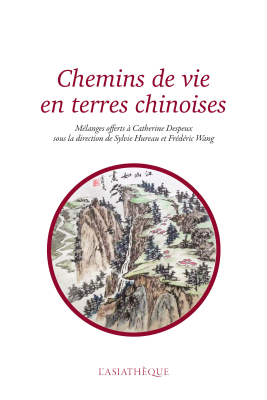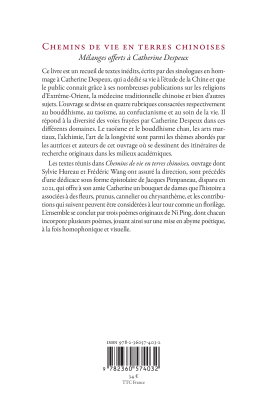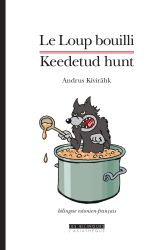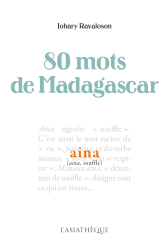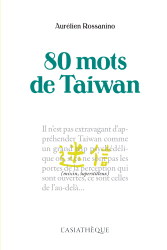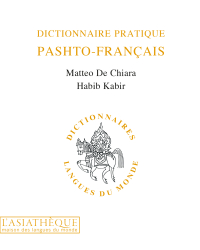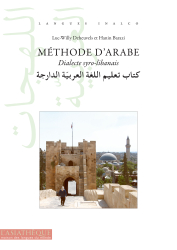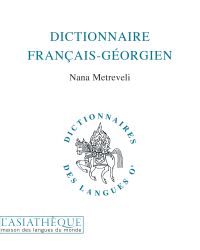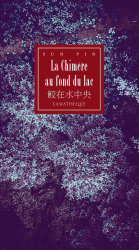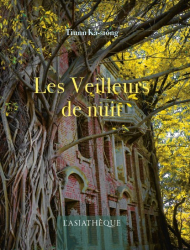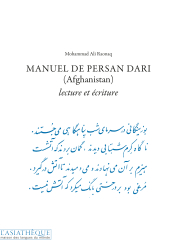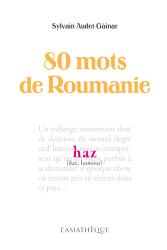Anonymous
Chemins de vie en terres chinoises
(Paths of life in Chinese lands)
Mélanges offerts à Catherine Despeux
(Festschrift offered to Catherine Despeux)
Chemins de vie en terres chinoises is a collection of previously unpublished texts written by sinologists in tribute to Catherine Despeux, who has dedicated her life to the study of China and is known to the public through her many publications on Far Eastern religions, traditional Chinese medicine and many other subjects.
The book is divided into four sections devoted respectively to Buddhism, Taoism, Confucianism and the care of life. It reflects the diversity of the paths taken by Catherine Despeux in these different fields. Taoism and Chan Buddhism, the martial arts, alchemy and the art of longevity are just some of the themes addressed by the authors in this book, which also explores original lines of research in academic circles.
CONTRIBUTORS' BIOGRAPHIES
Isabelle Ang
Isabelle Ang is a sinologist, lecturer at Collège de France and full member of the Centre de recherche sur les civilisations de l'Asie orientale (CRCAO). She is the editor of the various collections published by Institut des Hautes Études chinoises at Collège de France. Her research focuses on the history and current status of Chinese religious cults, combining research into sources (epigraphic, historical and literary) with fieldwork. Her main subjects of study are: the history of the cult of Xu Xun 許遜 (239-374) in Jiangxi and its topicality; the history of the cult of the immortal Lü Dongbin 呂洞賓; the territories and links of the god-caves and blessed lands (dongtian fudi 洞天福地) of Jiangxi with local cults. In particular, she has published articles on the revival of the cult of Xu Xun in Jiangxi, the rituals associated with this cult in a clan village and the pilgrimage dedicated to Xu Xun in Xishan, near Nanchang.
Stéphane Arguillère
Stéphane Arguillère is professor of Tibetan language and civilisation at Inalco (Institut national des langues et civilisations orientales) and a member of IFRAE. His research focuses on Tibetan scholasticism (Buddhist and Bön), Dzogchen and the history of the Nyingma school of Tibetan Buddhism. He is the author of a monograph on Longchenpa (Profusion de la Vaste Sphère, Peeters, 2007) and the translator of Tülku Tsullo's Manuel de la Transparution immédiate (le Cerf, 2016), for which he is currently preparing an English translation. S. Arguillère is the scientific coordinator of the ANR project ‘For a Critical History of the Northern Treasures’.
Alain Arrault
Alain Arrault is Director of Studies at École française d'Extrême-Orient and Director of Centre d'études sur la Chine moderne et contemporaine (UMR Chine Corée Japon, EHESS, CNRS, Université Paris Cité). He obtained a doctorate in Chinese studies (1995) after a master's degree in philosophy (1985), and was professor of Chinese studies at the University of Liège (Belgium) between 1996 and 2000. His first area of interest in Chinese studies was the history of thought and religion in pre-modern China (Song and Ming dynasties), in particular Wang Yangming and Shao Yong. He then concentrated on the history of Chinese annual calendars from the third century BC to the tenth century. In 2002, he took part in studies on ‘common religion’, in particular on religious practices in Hunan province, by analysing domestic statuary from the sixteenth century to the early twentieth century and conducting field surveys. This work has led to the publication of Shao Yong (1012-1077), poète et cosmologue (2002, IHEC), ‘Les calendriers’ in Divination et société dans la Chine médiévale (2003, BNF) and A History of Cultic Images in China. The Domestic Statuary of Hunan (2020, CUHK-EFEO).
Brigitte Baptandier
Brigitte Baptandier is an ethnologist and emeritus director of research at CNRS (Laboratoire d'ethnologie et de sociologie comparative, Nanterre). At Société d'ethnologie (Nanterre), she directs the collections ‘Recherches sur la Haute Asie’ and ‘Écritures’. Her research focuses on the feminine in Chinese religion (Taiwan and Fujian). She is interested in trance and the rites of cure and exorcism in the Lüshan Taoist tradition, which is close to shamanism and influenced by Tantric Buddhism. She is the author of La Dame du Bord de l'Eau (1988); The Lady of Linshui. A Chinese female cult (2008). Then, with K.I. Fryklund (translator) and M.E.Lewis, The Lady of Linshui Pacifies demons. A seventeenth-century novel (2021). On the relationship between writing, orality and the body, she has published Du corps au texte. Approches comparatives (2008); Le battement de la vie. Le corps naturel et ses représentations en Chine (2017). Recently, Que jamais le temps ne se brise. Voyage au Mont de la Fleur, Huashan (Shaanxi, China) (2023) deals with the imaginary of night.
Daniela Campo
Daniela Campo is a lecturer at the University of Strasbourg. A Sinologist and historian by training, she is interested in the relationship between, on the one hand, the birth of a ‘modern Chinese Buddhism’ from the end of the empire to the Republican era and, on the other, the reconstruction of Buddhism in the post-Maoist era and up to the present day. She has studied the links between hagiographic writing and the formation of religious leadership, and has subsequently focused on the evolution of the institutions (Dharma lineages, monastic discipline and education) and practices (meditation techniques and forms of teaching) of Chinese Buddhism, and of the Chan school in particular, in the twentieth century. Most of her work combines analysis of textual sources and fieldwork. She is the author of La construction de la sainteté dans la Chine moderne : la vie du maître bouddhiste Xuyun (2013) and co-edited the book ‘Take the Vinaya as Your Master’. Monastic Discipline and Practices in Modern Chinese Buddhism (with Ester Bianchi, 2023).
Patrick Carré
Patrick Carré, born in 1952, is a French sinologist, Tibetologist, translator, essayist and writer. In 1981, he defended a thesis on the Hanshan poems at Inalco. His work includes a considerable number of translations from Chinese and Tibetan of Buddhist poems and major texts of the Buddhism of the Great Vehicle (Mahâyâna). He is the author of six novels, two of which have won awards. Director of the ‘Trésors du Bouddhisme’ collection published by Fayard, he is a member of the Padmakara translation committee attached to the Centre d’études bouddhiques de Chanteloube at Saint-Léon-sur-Vézère in Dordogne, near where he lives.
Damien Chaussende
Damien Chaussende is a researcher at the CNRS and a member of Centre de recherche sur les civilisations de l'Asie orientale (CRCAO). His research focuses on the history and historiography of ancient and medieval China. He is the author of Des Trois royaumes aux Jin (2010) and translated the inner chapters of Liu Zhiji's Traité de l'historien parfait (Shitong) (2014). He has edited, jointly with François Martin, a Dictionnaire biographique du haut Moyen Âge chinois (2020), and with Daniel Morgan and Karine Chemla, a collection entitled Monographs in Tang Official Historiography (2019). He is currently editing a ten-volume general history of China for Les Belles Lettres.
Vincent Durand-Dastès
Vincent Durand-Dastès is professor of premodern Chinese literature at Inalco (Institut national des langues et civilisations orientales). His work focuses on the relationship between late imperial narrative literature and religion and the supernatural. His publications include: ‘Apprendre le taoïsme par la famine : l'initiation de Qiu “Éternel printemps”, patriarche de l'ordre Quanzhen, dans une hagiographie vernaculaire de la fin de l'Empire chinois’ (2021) ; ‘Corps impénétrables et nonnes entremetteuses : Destins romanesques de la “fille de pierre” (shinü 石女)’ (2022) ; ‘鬼 Gui, démon, revenant - esthétique spectrale, paradigme démoniaque et hantise des disparus’ (2022) and ‘Une matinée au théâtre des enfers: les incrustations narratives dans les rouleaux verticaux des Dix rois du monde des ténèbres de la Chine moderne’ (2022). He has edited Empreintes du tantrisme en Chine et en Asie orientale : imaginaires, rituels, influences (2016) and co-edited Fantômes dans l'Extrême-Orient d'hier et d'aujourd'hui (2017, with Marie Laureillard) and Récits de rêve en Asie Orientale (2018, with Rainier Lanselle).
Georges Favraud
Georges Favraud is a research associate at Centre d'anthropologie sociale du Laboratoire interdisciplinaire sociétés, solidarités, territoires (LISST -CAS, UT2J) and at Institut français de recherches sur l'Asie de l'est (Axe 3 - IFRAE, IN ALCO). He is founder and director of Institut des arts chinois du corps (IN ACC, UT2J), whose aims are to help structure this field of fundamental research and to build bridges between the academic world and ACC practitioners through the dissemination of knowledge, training programmes and participatory research. Georges Favraud's research focuses on Chinese embodied knowledge, and in particular Taoist knowledge, based on fieldwork carried out since 2003 in the central province of Hunan. He is working on the contemporary practices and transmission of this ancient knowledge (martial arts, meditation, medicine, as well as divination and geomancy). Through life stories, genealogies and the history of communities of practice, he is conducting a ‘bottom-up’ analysis of the processes of modernisation in China. Since 2021, he has also been interested in the reception and reinvention of these practices in France, in the context of the global process of cultural globalisation. He is also a practitioner and teacher of the so-called ‘internal’ martial arts, which he has studied for a long time in France (since 1979) and in China.
Gabriele Goldfuss
Gabriele Goldfuss is Director of International Relations at the City of Leipzig. She taught as a lecturer at the Institute of the Far East at the University of Leipzig between 1994 and 2001. Her thesis under the supervision of Catherine Despeux was published in 2001 at the Collège de France in the Mémoires de l'institut des Hautes Études chinoises series under the title Vers un bouddhisme du XXe siècle. Yang Wenhui (1837-1911), reformer, layman and printer. Eva Wechsberg and Channa Gildoni in German and English (Hentrich & Hentrich, 2021 and 2022), and Magisches Musandam. Omans ferner Norden (Georg Olms Verlag, 2023) with Wolfgang Zimmermann.
Vincent Goossaert
Vincent Goossaert is a historian, director of studies at EPHE, PSL and co-editor of T'oung-Pao, the oldest scientific journal of sinology in the West. He works on the history of pre-modern and modern Chinese religion, and is particularly interested in Taoism, the professions of religion, social and religious regulations, the production of moral standards, and sociability between humans and gods. He is the author of some twenty solo and collective works, including Making the Gods Speak. The Ritual Production of Revelation in Chinese History (2022), Heavenly Masters. Two Thousand Years of the Daoist State (2021), Vies des saints exorcistes. Hagiographies taoïstes, XIe-XVIe siècles (Paris, les Belles Lettres, 2021) and Bureaucratie et salut. Becoming a god in China (2017).
Romain Graziani
Romain Graziani is a professor of Chinese studies, and has developed his teaching and research work in the field of the intellectual and political history of ancient China. A translator and essayist, his publications focus on the practices of breath, the figures of sovereignty, the narratives of the Zhuangzi, the notions of father, spirit (shen) or even the status of non-human beings in Chinese society, but also penal amputation or institutional reforms at the time of the Warring Kingdoms. Latest publications: l'Usage du vide (Gallimard 2019); Fiction and Philosophy in the Zhuangzi (Bloomsbury, 2022). He is currently preparing a monograph on the status and role of numbers in Chinese political culture from the Bronze Age to the contemporary period.
Adeline Herrou
Adeline Herrou is an ethnologist and director of research at the CNRS (laboratoire d’ethnologie et de sociologie comparative, Nanterre). Her research into Taoist monks and temples in the south of Shaanxi province, in central China, is the first step in her study of contemporary Chinese society. She is the author of La Vie entre soi. Les moines taoïstes aujourd'hui en Chine (2005). From a comparative perspective, she has coordinated, among other works, the book Une journée dans une vie. Une vie dans une journée. Des ascètes et des moines aujourd’hui (2018), with G. Chicharro, S. Gros and A. Névot the book le Féminin et le Religieux (L'Asiathèque, 2022) and with C. Vidal the issue ‘Ma Chine à remonter le temps’ of the journal Ateliers d'Anthropologie (2023).
Sylvie Hureau
Sylvie Hureau is a lecturer in the Religious Sciences section of École Pratique des Hautes Études (EPHE-PSL), in the Chinese Buddhism chair. She is a member of the CRCAO (UMR 8155). Her teaching and research focus on the history of the transmission and reception of Buddhism during the period of the Southern and Northern dynasties (3rd-6th centuries). She is the author of the notes ‘Sources de l'histoire du bouddhisme chinois’ and ‘Biographies de moines et de moniales bouddhistes’ in N. Kouamé, É. Meyer and A. Viguier (eds.), Encyclopédie des historiographies. Genres et corpus, Paris, Presses numériques de l'Inalco, 2019 and nearly a hundred entries in the Dictionnaire biographique du haut Moyen Âge chinois,D. Chaussende and F. Martin (eds.) (Paris, les Belles Lettres, 2020).
Ji Zhe
Ji Zhe is professor of sociology of religions at the Institut national des langues et civilisations orientales (Inalco) and director of the Centre d'études interdisciplinaires sur le bouddhisme (CEIB). His research focuses on the revival of Buddhism in the contemporary Chinese world, with an attempt to combine theoretical tools and sociological, anthropological and historical research methods in order to analyse the changing relationship between belief, knowledge and power in China, placing it in the context of modernity and globalisation. He is notably the author of Religion, modernité et temporalité : une sociologie du bouddhisme chan contemporain (2016) and the co-editor of Making Saints in Modern China (with David Ownby and Vincent Goossaert, 2017) and Buddhism after Mao: Negotiations, Continuities, and Reinventions (with Gareth Fisher and André Laliberté, 2019).
Cédric Laurent
Cédric Laurent is a professor of Chinese language, literature and civilisation at Rennes 2 University (ERIMIT ). He teaches classical literature and the history of Chinese art, and conducts research into the relationship between painting and literature in China. His work on Ming painting (1368-1644) involves deciphering painted motifs in the light of literature, and occasionally opens up to a wide variety of fields, from curiosa to incense and contemporary art. His books include Voyages immobiles dans la prose ancienne : la peinture narrative sous la dynastie Ming (Paris, Les Belles Lettres, 2017) and Retrouver son Coeur : La méditation dans la peinture et la poésie chinoises du XVe au XVIIe siècle (Paris, L'Asiathèque, 2021).
Valérie Lavoix
Valérie Lavoix is a lecturer in classical Chinese language and literature at Inalco, a full member of IFRAE (UMR 8043) and an associate member of CRCAO (UMR 8155). In addition to her work on literary criticism (Wenxin diaolong, ‘Spirit of literature in chiselled dragon’) and poetry (fu, poetic exposition or rhapsody) in early medieval China (3rd-6th century), she has published on the socio-cultural history and lay Buddhism of the period ‘La contribution des laïcs au végétarisme: croisades et polémiques en Chine du Sud autour de l'an 500’ (in C. Despeux, Bouddhisme et lettrés dans la Chine médiévale, 2002), and ‘À l'école des collines - L'enseignement des lettrés reclus sous les Dynasties du Sud’ (in C. Nguyen Tri and C. Despeux, Éducation et instruction en Chine (vol.3), Aux marges de l'orthodoxie, 2004).
Li Guoqiang
Li Guoqiang, who holds a doctorate in historical ethnobiology from the Muséum national d'histoire naturelle, is a lecturer at the Université Paris Nanterre and a member of the Centre de recherche sur les civilisations de l'Asie orientale (CRCAO). Her research focuses on exploring the triangular interaction between man, nature and culture in ancient China. Author of numerous articles and books, his work has focused in particular on the mulberry tree, millet, domestic animal sacrifices and calendar phenology. His recent work also includes the history and network of botanical collections made by missionaries of the Paris Foreign Missions in Yunnan and south-west China, and their contributions to modern botanical science.
Liu Hong
Liu Hong, senior lecturer at the Institut national des langues et civilisations orientales, defended a thesis entitled Une vision de la Chine lettrée et de sa bureaucratie sous les Song du Nord (960-1127) (2007). Her research focuses on the literature of notebooks (Biji 筆記) and the history of the literati of the Song period. She has published ‘The Dhāranī Practice of Great Compassion in Twelfth-Century China According to the Yi jian zhi (1198)’ in Empreintes du tantrisme en Chine et en Asie orientale (Peeters, Louvain, 2017) and ‘Les Relations entre les monoines bouddhistes et les lettrés lors de la renaissance confucéenne dans la Chine des Song du Nord’ in Construction and Interpretation of the Daotong: In the Perspectives of Chinese and Korean Neo-Confucianism (no. 4, Zhedong Xueshu, 2020).
Ni Ping
Ni Ping, a researcher on Buddhist philosophy and literature and a lecturer at Shanghai Fudan University, is a specialist in the Buddhist phenomenology of the Nothing-Consciousness school (Vijnaptimatra). He also conducts research into the rhetoric of poetry, calligraphy and painting. His publications include the books Mise en oeuvre de la phénoménologie bouddhique de l’école Rien-que-Conscience (Vijnaptimatra) with Yuan Hongdao (2017), l’édit impérial de l’empereur Yongzheng/le Soûtra des dix actes vertueux (2023) which he translated with Julie Simon.
Jacques Pimpaneau
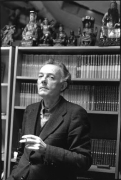
Jacques Pimpaneau (1934-2021) has taught Chinese language and literature for nearly 35 years at Inalco (Institut national des langues et civilisations orientales). A lover of the Chinese performing arts, he conducted pioneering research into puppetry (Des poupées à l'ombre) and Chinese theatre (Promenade au jardin des poiriers). From his stays in China (1958-1960) and Hong Kong (1968-1971), as well as a strong aversion to the Maoist regime and all forms of state authoritarianism, he brought back the magnificent collection of the Musée Kwok-on, which he showed to the public in a former workshop in the Marais district until this magnificent collection of objects on Asian religions and theatres left for Lisbon in 1999. Keen to address his students and the general public first and foremost, he published numerous translations and many works providing an introduction to classical Chinese culture, such as Mémoires de la cour céleste : mythologie populaire chinoise ; Lettre à une jeune fille qui voudrait partir en Chine ; Anthologie de la littérature chinoise classique ; Li Yu : la Chair comme tapis de prière (with Pierre Klossowski) ; Ji Yun : Notes de la chaumière des observations subtiles ; Biographies des regrets éternels : vies de Chinois illustres ; Les Mémoires historiques de Sima Qian, etc. He has also directed some twenty documentaries on spectacles and religions, in China as well as in India and Tibet.
Pénélope Riboud
Pénélope Riboud is a sinologist specialising in the history and society of medieval China. A long-time lecturer at Inalco and member of IFRAE, she is now working as an independent researcher on the material and visual cultures of pre-modern and modern China.
Éric Szczurek
Éric Szczurek (1961-2022) trained in the field of comparative literature (master's degree in 1989, DEA in 1990), and qualified as a teacher of modern literature (1992) and classical literature (2019, top of his class). He has held various teaching posts in the Besançon education authority, and was seconded to the Ministry of Foreign Affairs at the French embassy in Seoul as a cooperation attaché (1996-2000), to the French school in Kuala Lumpur as a teacher (1993-1995), and then to the Alliance française in Kuala Lumpur (2003-2005), where he was director. At the Mission laïque française, he was director of a French business school in Finland (2007-2013) and taught in Scotland (2013-2015). Since 1986, despite multiple teaching and administrative responsibilities, he has been passionate about language learning (Chinese, Korean, Finnish, English, Latin) and has published numerous theoretical and imaginative articles in journals, notably Cahiers de Corée.
Frédéric Wang
Frédéric Wang is professor of the history of Chinese thought at the Institut des langues et civilisations orientales (Inalco) and a member of IFRAE (UMR 8043). His current research focuses on Confucianism, particularly in the sixteenth century. Author of Approche sémiotique de Maurice Blanchot (1998), Wang Tingxiang (1474-1544) et le néo-confucianisme mis en question (2023), he edited the collective work le Choix de la Chine d'aujourd'hui : entre la Chine et l'Occident (2010), coordinated issue 277-278 of Diogène, ‘Modernités en Asie orientales (Chine, Corée, Japon, Vietnam)' (2022) and, with Stéphane Feuillas, issue 265-266 of the same journal, ‘De proches amis venus de loin: amitiés dans l'Asie orientale' (2019). He is also editor of the ‘Mondes chinois’ collection published by Indes savantes.
TABLE OF CONTENTS
Sommaire
Introduction par Sylvie Hureau et Frédéric Wang.
Ouverture
- Femmes-fleurs dans l’empire Chinois, Lettre à Catherine Despeux par Jacques Pimpaneau.
Doctrines et spiritualités bouddhiques
- Liu Xie (ca 465-521) : « Pour anéantir les idées fausses. » - Où le bouddhisme n’est pas plus délétère que le taoïsme n’est salvateur par Valérie Lavoix.
- Du buffle au poisson et encore au buffle. Protéger, sauver et dresser les animaux. Quelques anecdotes pas si anecdotiques dans les Biographies des moines éminents par Sylvie Hureau.
- L’Essentiel de l’esprit par Patrick Carré.
- Le chapitre IX du Trésor de l’élément réel de Longchenpa par Stéphane Arguillère.
- Instructions pour la méditation du maître Chan Foyuan (1923-2009) par Daniela Campo.
Patriarches, pacificateurs, immortelles et moniales
- Li Gou et Magu : une rencontre manquée ? par Isabelle Ang.
- La vieille mère du mont Li transmet ses arts magiques à Jiang la tigresse. Au mont Guojie, Jiang Hupo et Chen Jinggu deviennent sœurs jurées par Brigitte Baptandier.
- Un petit déjeuner au lupanar ou comment Bodhidharma fut converti au taoïsme par Vincent Durand-Dastès.
- Le mythe de Sa Shoujian par Vincent Goossaert.
- Cao Xiangzhen, La course aux obstacles d’une moniale taoïste par Adeline Herrou.
Saints, souverains, lettrés et femmes jalouses
- Un monarque évoque sa bibliothèque : Note sur un texte de l’empereur Yuan des Liang (508-555) par Damien Chaussende.
- Han Yu (768-824) et sa double lecture de Mencius par Frédéric Wang.
- Épouses jalouses et fantômes par Liu Hong.
- Récit sur les peines de l’étude, Gao Panlong (1562-1626) par Cédric Laurent.
- La sainteté à l’épreuve de la modernité : un double défi par Ji Zhe.
- La maison du lettré chinois à l’Exposition internationale de l’industrie du livre et des arts graphiques. Un épisode chinois à Leipzig du début du XXe siècle par Gabriele Goldfuss.
Le soin de la vie et autres savoirs
- Discours sur le soin de la vie (Yangsheng lun) par Romain Graziani et Pénélope Riboud.
- Formes animales et élaboration de l’humain dans les savoirs incorporés de la tradition yangsheng par Georges Favraud.
- La « Rhapsodie du Mingjia » : plante calendaire d’heureux présage sous les Han et les Tang par Li Guoqiang.
- Codification du savoir géographique et particularismes régionaux sous les Tang par Alexis Lycas.
- Fragments de vie, fragments de savoir. La rencontre du moine évangélisateur et de l’abbé prévaricateur par Alain Arrault et Éric Szczurek.
Clôture
- Poèmes écrits pour Catherine Despeux par Ni Ping.
